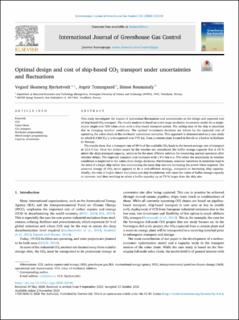| dc.contributor.author | Bjerkevedt, Vegard | |
| dc.contributor.author | Tomasgard, Asgeir | |
| dc.contributor.author | Roussanaly, Simon | |
| dc.date.accessioned | 2020-11-18T14:05:52Z | |
| dc.date.available | 2020-11-18T14:05:52Z | |
| dc.date.created | 2020-11-09T14:32:08Z | |
| dc.date.issued | 2020 | |
| dc.identifier.issn | 1750-5836 | |
| dc.identifier.uri | https://hdl.handle.net/11250/2688520 | |
| dc.description.abstract | This study investigates the impact of operational fluctuations and uncertainties on the design and expected cost of ship-based CO2 transport. The model analysis is based on a two-stage stochastic investment model for a single-source single-sink CCS value chain with a ship-based transport system. The sailing time of the ship is uncertain due to changing weather conditions. The optimal investment decisions are driven by the expected cost of operating the value chain in the stochastic operational scenarios. This approach is demonstrated on a case study in which 0.4 MtCO2/y is transported over 715 km, from a cement plant located in Brevik to a harbor in Kollsnes in Norway. The results show that a transport rate of 99 % of the available CO2 leads to the lowest average cost of transport at 33.8 €/ton. Once the delays caused by the weather are considered, the buffer storage capacity that is 18 % above the ships transport capacity, seems to be the most efficient solution for recovering normal operation after weather delays. The expected transport cost increases with 1.9 €/ton (i.e. 5%) when the uncertainty in weather conditions is neglected in the value chain design decisions. Furthermore, seasonal variations in emissions lead to the need of a larger ship rather than maintaining the same ship size and increasing the power when required. The seasonal storage of CO2 never appears to be a cost-efficient strategy, compared to increasing ship capacity. Finally, the risks of higher future fuel prices and ship breakdowns will cause the value of buffer storage capacity to increase, and thus resulting to select a buffer capacity up to 73 % larger than the ship size. | en_US |
| dc.description.abstract | Optimal design and cost of ship-based CO2 transport under uncertainties and fluctuations | en_US |
| dc.language.iso | eng | en_US |
| dc.publisher | Elsevier | en_US |
| dc.rights | Navngivelse 4.0 Internasjonal | * |
| dc.rights.uri | http://creativecommons.org/licenses/by/4.0/deed.no | * |
| dc.title | Optimal design and cost of ship-based CO2 transport under uncertainties and fluctuations | en_US |
| dc.type | Peer reviewed | en_US |
| dc.type | Journal article | en_US |
| dc.description.version | publishedVersion | en_US |
| dc.source.volume | 103 | en_US |
| dc.source.journal | International Journal of Greenhouse Gas Control | en_US |
| dc.identifier.doi | 10.1016/j.ijggc.2020.103190 | |
| dc.identifier.cristin | 1846217 | |
| dc.relation.project | Norges forskningsråd: 257579 | en_US |
| dc.description.localcode | DOI 10.1016/j.ijggc.2020.103190. Available online 2 November 2020 1750-5836/© 2020 The Author(s). Published by Elsevier Ltd. This is an open access article under the CC BY license (http://creativecommons.org/licenses/by/4.0/) | en_US |
| cristin.ispublished | true | |
| cristin.fulltext | original | |
| cristin.qualitycode | 1 | |

